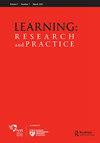Implementation of blended learning in professional development programmes for school principals: factors affecting the satisfaction of principals from disadvantaged areas in Vietnam
Q2 Social Sciences
引用次数: 3
Abstract
ABSTRACT To support the implementation of Vietnam’s new general education curriculum, Vietnam Ministry of Education and Training is organising a professional development programme integrating blended learning models for principals of general education institutions. In the period of educational reforms, there is a need for high-quality professional development for school principals. The satisfaction level of learners is an important indicator of the quality of a professional development programme. This study proposes a research model to analyse critical factors affecting the satisfaction of principals from disadvantaged areas in Vietnam with the professional development programme. In total, 1036 valid responses were received from 1096 principals (equivalent to 94.53%) of primary, secondary, and postsecondary schools in disadvantaged areas. The collected data set is then evaluated by exploratory factor analysis and regression analysis. The results show that all factors include learning objectives, course content, instructional methods, course assessment, technology support and organising and planning affect learners’ satisfaction, however, at different levels. Organising and planning, course content and instructional methods are the three most influential factors positively affecting learners’ satisfaction. Another finding is that non-minority groups are more satisfied with the programme than ethnic minority groups.在校长专业发展计划中实施混合式学习:影响越南弱势地区校长满意度的因素
为了支持越南新的通识教育课程的实施,越南教育培训部正在为通识教育机构的校长组织一个整合混合学习模式的专业发展计划。在教育改革时期,学校校长需要高质量的专业发展。学习者的满意度是专业发展项目质量的重要指标。本研究提出一个研究模型,分析影响越南弱势地区校长对专业发展计划满意度的关键因素。我们共收到来自弱势地区小学、中学及专上学校1096名校长(占94.53%)的1036份有效回复。然后对收集到的数据集进行探索性因子分析和回归分析。结果表明,学习目标、课程内容、教学方法、课程评价、技术支持和组织策划等因素对学习者满意度的影响程度不同。组织计划、课程内容和教学方法是对学习者满意度影响最大的三个因素。另一个发现是,非少数群体比少数群体对该计划更满意。
本文章由计算机程序翻译,如有差异,请以英文原文为准。
求助全文
约1分钟内获得全文
求助全文

 求助内容:
求助内容: 应助结果提醒方式:
应助结果提醒方式:


